Choosing Freedom
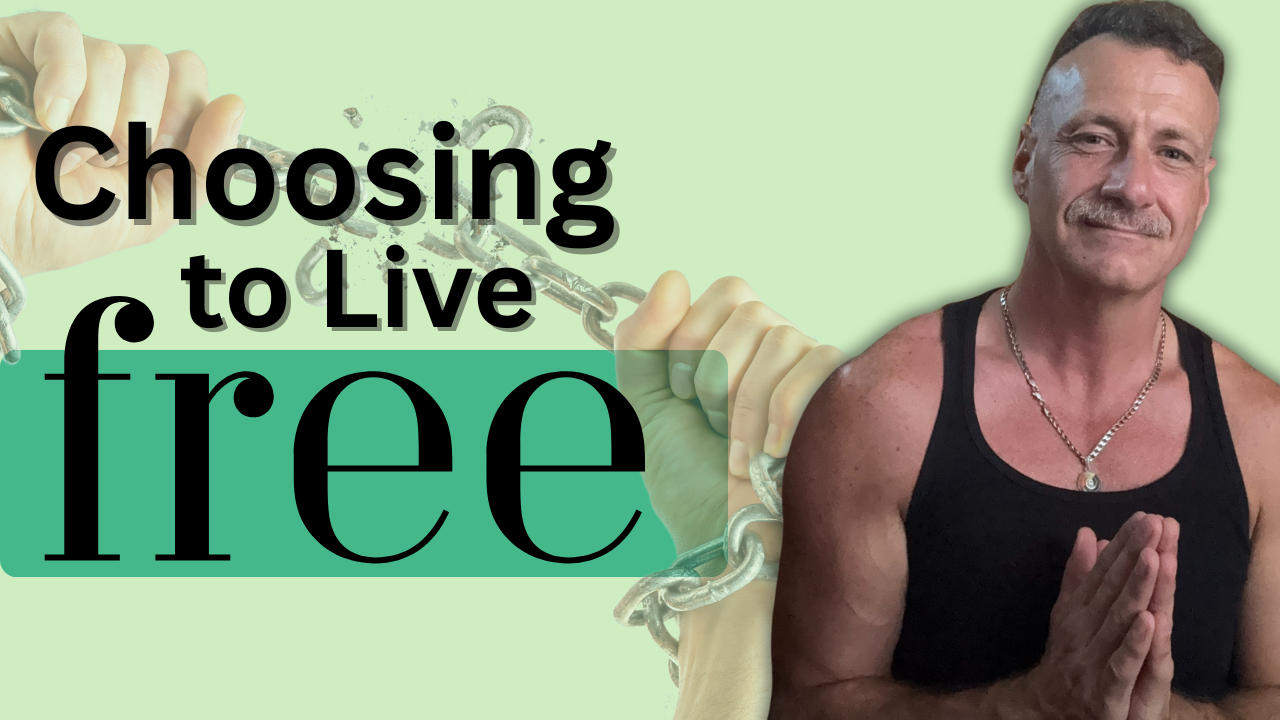
This is Part 4 of our 4-part series "Breaking Free from the Approval Trap" (See part one, part two, part three).
Marcus's New Path: Conscious Connection
Marcus is sitting across from me on our Zoom call, and something is different. There's a settledness in his body that wasn't there six months ago. A quietness in his eyes.
"I had a moment this week," he says, "that made me realize how far I've come."
He tells me about going to a gay bar with friends—his first time in that environment since getting substance-free. The old triggers were everywhere: guys checking him out (or not checking him out), opportunities to perform and seek validation, the ever-present question of whether he was attractive enough, interesting enough, desirable enough.
"Two months ago, I would have been checking myself in every reflection, adjusting my shirt, trying to make eye contact with the hottest guys in the room," he says. "Or I would have avoided going entirely because I knew I'd get triggered and want to use."
"What was different this time?" I ask.
"I was just... there. Present. Having actual conversations with my friends. When I caught myself starting to perform for someone's attention, I paused. Asked myself the question: 'What am I really seeking right now?' And I realized I wasn't seeking anything. I was actually okay just being me."
He pauses, and I can see emotion rise in his throat.
"For the first time in my life, I didn't need the room to validate me to feel okay about myself."
This is what freedom looks like. Not the absence of triggers, but the presence of choice.
The Daily Practice of Freedom
Freedom from validation addiction isn't a destination you reach—it's a daily practice you commit to. Marcus has learned this the hard way.
In his first months of working with me, he'd have breakthrough moments in our sessions, feel amazing for a few days, then slowly drift back into old patterns. The compulsive app checking would creep back in. The fishing for compliments. The performing at work meetings.
"I'd get so frustrated," he tells me. "I'd think 'I already learned this! Why am I back here again?'"
Because transformation isn't linear. It's cyclical. You learn something, practice it, forget it, remember it, practice it again, deepen it, forget it in a new way, remember it more deeply.
The difference between someone who transforms and someone who stays stuck isn't that the transformed person never backslides—it's that they have practices to return to when they do.
Marcus now has a morning routine that grounds him in self-validation before he ever picks up his phone. Ten minutes, every morning, no exceptions.
His Morning Validation Practice:
Three things he validates about himself—not accomplishments, but qualities of character or moments of authenticity from the previous day.
One way he showed up as his genuine self recently.
One moment he chose conscious validation over compulsive seeking.
One thing he gives himself permission to be or feel that day.
One thing he doesn't need anyone else to tell him.
"It felt stupid at first," he admits. "Like I was just making stuff up. But after a few weeks, something shifted. I started actually believing what I was writing. My nervous system started to register that I could be my own source of validation."
This is the foundation. When you start your day by validating yourself, you're not desperately empty when you encounter the world. You have something inside to draw from.
I help gay men break free from the addictive patterns of chemsex (Tina) and become their best and highest selves. My 1:1 coaching, Recovery Alchemy, is a six-month, intense program that can literally change your life. I accept 2 new clients per month. Apply Here.
The 90-Second Rule in Real Life
The practice that's been most transformative for Marcus is what I call the 90-Second Rule, and he uses it multiple times a day now.
Research shows that an emotion, when fully felt without resistance, moves through your nervous system in about 90 seconds. The only reason emotions last longer is that we keep retriggering them with our thoughts or trying to escape them with behaviors.
When Marcus feels the urge to seek validation—whether it's opening Grindr, posting for likes on Instagram, or performing in a meeting—he stops. Sets a timer on his phone. And feels the discomfort for 90 seconds without doing anything about it.
"The first time I tried it, I was convinced it wouldn't work," he says. "The urge to check my phone felt so intense, like I'd die if I didn't. But I set the timer and just... felt it. Where it was in my body. What it felt like. By 60 seconds, it had peaked. By 90 seconds, it was decreasing. And suddenly I had a choice about whether to open the app or not."
He wasn't being controlled by the compulsion anymore. He had space between stimulus and response. That space is freedom.
Now he uses it everywhere:
- Before opening hookup apps
- Before posting on social media
- Before seeking reassurance from friends
- Before performing for approval at work
- Before checking his phone compulsively
Ninety seconds of feeling the discomfort instead of immediately medicating it. And in that 90 seconds, the compulsion loses its power.
Sex Without Validation: The Reclamation
One of the hardest areas for Marcus to transform has been his sexual life. Sex and validation had become so intertwined that he couldn't separate them.
"Every sexual experience was a performance review," he tells me. "Did I get hard fast enough? Did I last long enough? Did I make them come? Was my body good enough? Was I a good top/bottom? The whole time, I was in my head, performing, trying to get validated as 'good at sex' instead of actually experiencing pleasure or connection."
And when the validation didn't come—when someone didn't respond after a hookup, or when he couldn't perform the way he wanted—the shame spiral would begin. "I'm not desirable. Something's wrong with me. I need to fix this." And crystal would start whispering its promises.
Learning to have sex for connection and pleasure rather than validation has been a complete reprogramming for Marcus.
Now, before any sexual encounter, he does a check-in with himself:
Marcus's Sexual Intention Check-In:
"What am I genuinely seeking right now?"
- Sexual pleasure and sensation?
- Connection with another person?
- To feel desired and validated?
- To numb uncomfortable feelings?
- To prove something about myself?
"Can I be authentic and vulnerable, or am I performing?"
If the answer is primarily about seeking validation or performing, he doesn't proceed. Not because seeking validation through sex is "bad," but because he knows it doesn't actually meet the need and often triggers his cravings.
When he does choose to engage sexually, he practices staying present:
- Feeling sensations in his body
- Being honest about his desires
- Letting go of performance anxiety
- Connecting authentically with his partner
- Not measuring his worth by the outcome
"I had sex last week that wasn't 'perfect' by my old standards," he tells me. "I didn't stay hard the whole time. We had to adjust what we were doing. Old me would have spiraled into shame. But I just... stayed present. Communicated. Laughed a little. And we still had a good time. And afterward, I didn't need him to tell me I was amazing or attractive. I felt okay with how it went."
This is sexual freedom—not perfect performance, but authentic presence.
The Apps: Conscious Use vs. Compulsive Escape
Marcus hasn't deleted his hookup apps. This surprises a lot of people when I tell them.
Anyone who follows my content will attest to how vehemently I recommend blocking geosocial dating apps and deactivating social media.
But, at a certain point, almost every gay man I know will return to the app eventually. So, why not return with intention?
Here's the thing: the apps aren't the problem. The compulsive, validation-seeking way he was using them was the problem.
Deleting and blocking apps can be a healthy boundary for some people, especially early in recovery. But for Marcus, learning to use them consciously—to have choice about when and how he engages—has been more empowering than simply eliminating them.
Now, before opening any app, Marcus has a protocol:
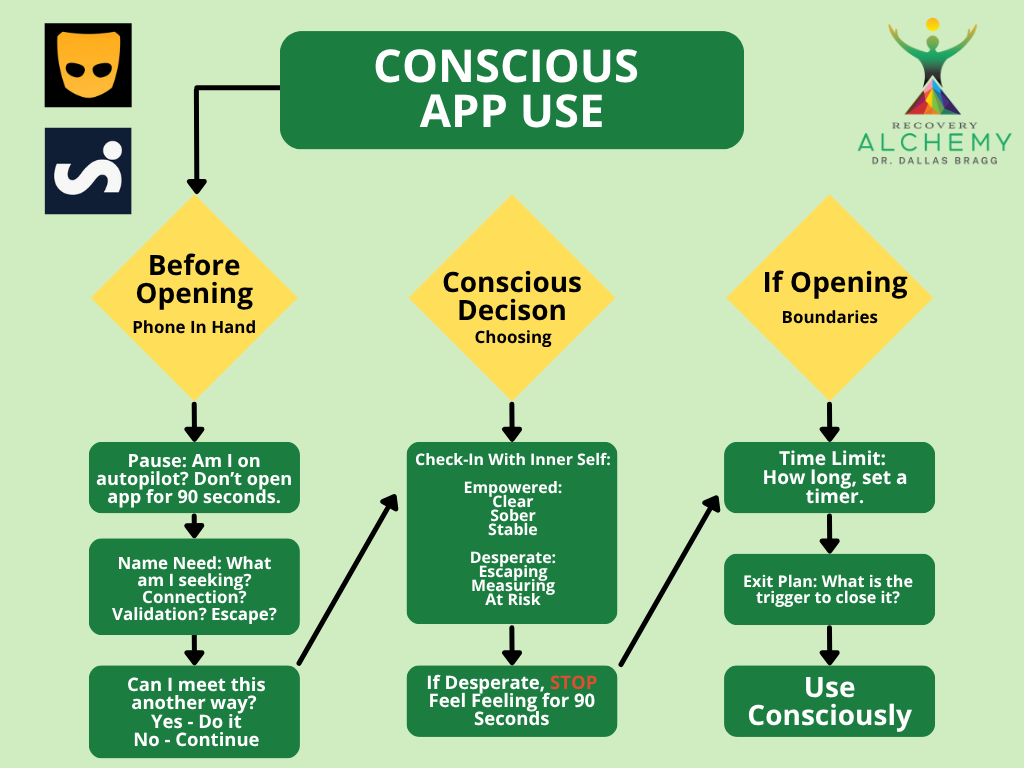
The Conscious App Use Protocol:
1. Pause. Don't open automatically. Notice the impulse.
2. Name the need. "What am I really seeking right now?"
- Sexual connection?
- Validation that I'm desirable?
- To numb loneliness or boredom?
- To escape uncomfortable feelings?
3. Check alternatives. "Can I meet this need without the app?"
- If seeking connection: Can I text or call a friend?
- If seeking validation: Can I validate myself right now?
- If escaping feelings: Can I feel them for 90 seconds first?
4. Decide consciously. "If I choose to open the app, am I doing so from empowerment or desperation?"
- Empowerment: Clear intention, protecting sobriety, can handle any outcome
- Desperation: Trying to escape feelings, measuring worth by responses, sobriety at risk
5. Set a boundary. If opening the app: "How long will I engage? What's my exit plan?"
"Most of the time now," Marcus says, "when I go through this protocol, I realize I don't actually want to open the app. I want something else—connection, validation, distraction—and there are better ways to get it. But sometimes I do open it consciously. I'm looking to meet someone, I'm clear about what I want, and I'm not desperately needing validation from how many responses I get."
The apps don't control him anymore. He controls how and when he uses them.
The Body Image Shift
Marcus's body was his primary validation machine for years. If his abs were visible, he felt valuable. If he gained five pounds, he felt worthless. The gym wasn't about health—it was about maintaining the body that would get him validation.
"I'd work out twice a day sometimes," he tells me. "Not because I enjoyed it, but because I was terrified of losing the attention my body got me. Every meal was calculated. Every mirror was a judgment. My body became a full-time job of seeking approval."
In Recovery Alchemy, we worked on separating his body from his worth. This wasn't about not caring about his body—it was about caring for it from a different place.
Marcus started a daily practice I call Body Gratitude:
Every day, he writes down:
- One thing his body did that had nothing to do with appearance
- One way he showed his body kindness
- One appearance-based judgment he let go of
"Yesterday I wrote: 'My body walked three miles and carried all my groceries. I fed it nourishing food without calculating calories. I let go of the judgment that my arms aren't big enough,'" he says. "Simple stuff. But it's retraining my brain to see my body as something that serves me, not something I have to perfect to get approval."
He also did a one-week challenge that terrified him: No body-checking in mirrors beyond necessary grooming, no comparing himself to others on social media, no weighing himself, no comments about his or others' bodies.
"The first two days, I felt so anxious. Like I needed to know if I still looked acceptable. But by day four, something shifted. I realized how much mental energy I was spending on appearance-based validation. And when I stopped feeding that loop, I had so much more energy for actually living."
Now Marcus works out because it feels good in his body and supports his mental health—not because he's desperate for Instagram likes on his gym selfie.
The Validation Inner Circle
Marcus learned that he needed healthy validation from trusted others—not as a replacement for self-validation, but as a supplement. Humans are wired for connection. Needing validation from others isn't pathology when it's the right kind from the right people.
He identified five people who give him healthy validation:
- His best friend from college who knows his whole story
- His sister who's seen him at his worst and still loves him
- One guy from his Recovery Alchemy group coaching
- Me (his coach)
These people:
- Actually know him, not just his performance
- Validate who he is, not just what he does
- Don't require him to hide parts of himself
- Give validation that feels grounding, not like a hit he needs more of
- Are people he can also give validation to reciprocally
"When my sister tells me she's proud of how I'm showing up in recovery, it lands differently than when a stranger on Grindr tells me I'm hot," Marcus says. "One feels nourishing. The other feels empty."
He also learned to remove or reduce sources of unhealthy validation:
- Certain friends who only related to him through partying and hookup culture
- Instagram accounts that triggered comparison and body shame
- Situations where he felt pressure to perform for approval
"I used to think I needed everyone to validate me," he says. "Now I realize I need a few people to truly see me. That's enough."
Your Journey Begins
Marcus's story isn't over. He's still in the process of transformation, still practicing, still learning. But he's free in a way he never was before—free to be himself, free to feel his feelings, free from the desperate need for constant external validation.
And he's substance-free. One day at a time, one conscious choice at a time, one moment of self-validation at a time.
This freedom is available to you too.
It starts with recognizing the prison you're in—seeing how validation addiction has been running your life and connecting to your substance use.
It deepens with understanding where it came from—having compassion for the wounded child who developed these patterns to survive.
It transforms through integration—working with your needs instead of against them, learning healthy validation from unhealthy, developing the capacity to validate yourself.
And it sustains through daily practice—the morning validations, the 90-second pauses, the conscious choices, the rejection resilience, the craving protocols.
You don't have to do this perfectly. You don't have to do it all at once. You just have to begin.
Begin by seeing the patterns. Begin by understanding with compassion. Begin by practicing self-validation, even if it feels fake at first. Begin by choosing consciousness over compulsion, even just once. Begin by believing that freedom is possible for you.
Because it is.
Your validation addiction made sense. It served you once. And now, with integration, awareness, and practice, you can transform it into something that actually nourishes you instead of depleting you.
You can stay substance-free through validation wounds. You can be authentically yourself without needing constant approval. You can build genuine connections instead of performing for crowds. You can feel okay about yourself even when others don't validate you.
This is the freedom waiting for you on the other side of this work.
Marcus found it.
And so can you.
Love, Dallas
JOURNAL PROMPTS FOR PART 4
Prompt 1: Your Morning Validation Practice
Starting tomorrow, commit to a 7-day morning validation practice. Before checking your phone each morning, write:
Day 1: Three things I validate about myself (qualities, not accomplishments):
One way I showed up authentically yesterday: _______________________
One moment I chose conscious validation over compulsive seeking: _____
Today I give myself permission to: ________________________________
Today I don't need anyone to tell me that: ________________________
[Repeat for Days 2-7]
After 7 days, reflect: What changed in your internal experience over the week? Did your baseline sense of worth shift at all? What resistance came up? What surprised you?
Prompt 2: The 90-Second Rule Experiment
This week, practice the 90-Second Rule at least five times when you feel the urge to seek validation.
For each instance, document:
Instance 1: What triggered the urge to seek validation? ____________________________ Where did I feel it in my body? ____________________________________ What happened during the 90 seconds? _________________________________ Did the urge pass, decrease, or stay the same? _____________________ What did I choose to do after? _____________________________________
[Repeat for Instances 2-5]
Integration Question: What did you learn about the relationship between feeling discomfort and the compulsion to seek validation? When you gave yourself 90 seconds, what changed about your sense of choice?
Prompt 3: Your Rejection Resilience Protocol
Think of a recent rejection or lack of validation that triggered you (someone didn't respond to your message, feedback at work was lukewarm, a date didn't go well, a post got fewer likes than expected).
Run through the protocol:
STEP 1 - NOTICE: What happened? ____________________________________________________ What story is my mind telling me? _________________________________
STEP 2 - FEEL (spend 2 actual minutes feeling this): Where is this in my body? _________________________________________ What's the physical sensation? ____________________________________
STEP 3 - QUESTION: Is the story my mind is telling me TRUE? Evidence for: ____________________________________________________ Evidence against: ________________________________________________ More balanced truth: _____________________________________________
STEP 4 - VALIDATE: One thing I know is true about me regardless of this rejection:
STEP 5 - CHOOSE: What healthy action can I take right now? __________________________
STEP 6 - RECOMMIT: My commitment to myself and my sobriety: ___________________________
Reflection: How did this process change your emotional state compared to your usual reaction to rejection? What would you do differently next time?
[Space for 10-15 lines of reflection]
Prompt 4: Healthy vs. Unhealthy Validation Inventory
Make a comprehensive list of where you're currently seeking validation. Then categorize and strategize.
MY CURRENT VALIDATION SOURCES:
UNHEALTHY VALIDATION (from strangers, based on appearance/performance, feels like a "hit," creates craving):
Frequency: _____ times per day/week Impact on my sobriety: ________________________________________ What I'm going to reduce/eliminate: ___________________________
Frequency: _____ times per day/week Impact on my sobriety: ________________________________________ What I'm going to reduce/eliminate: ___________________________
Frequency: _____ times per day/week Impact on my sobriety: ________________________________________ What I'm going to reduce/eliminate: ___________________________
HEALTHY VALIDATION (from people who know me, affirms authentic self, feels grounding):
- Name: _____________________________________________________ Why they're safe: _____________________________________________ How often I connect with them: _________________________________ How I can increase this connection: ____________________________
- Name: _____________________________________________________ Why they're safe: _____________________________________________ How often I connect with them: _________________________________ How I can increase this connection: ____________________________
- Name: _____________________________________________________ Why they're safe: _____________________________________________ How often I connect with them: _________________________________ How I can increase this connection: ____________________________
ACTION PLAN: This week, I will reduce unhealthy validation by: ___________________
This week, I will increase healthy validation by: ___________________
One Month Check-In: How has shifting the ratio of healthy to unhealthy validation affected your cravings? Your sense of stability? Your relationships?
Prompt 5: Your Freedom Vision & Daily Practice Commitment
Marcus's freedom didn't happen by accident—it happened through consistent daily practice. Now it's time to design yours.
ONE YEAR FROM NOW:
If I'm free from validation addiction, my life will look like:
My relationships will be: __________________________________________
My relationship with my body will be: _____________________________
My sexual experiences will be: ____________________________________
My use of apps/social media will be: ______________________________
My sobriety will feel: ___________________________________________
The biggest difference will be: __________________________________
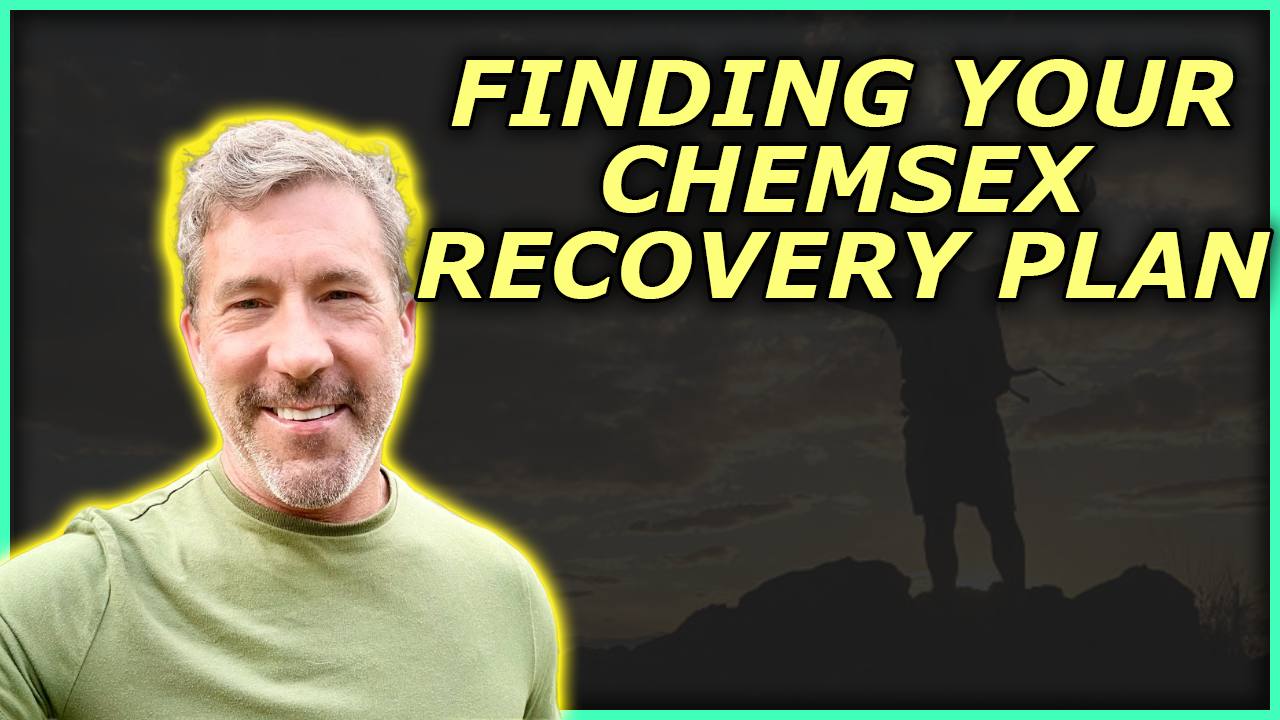
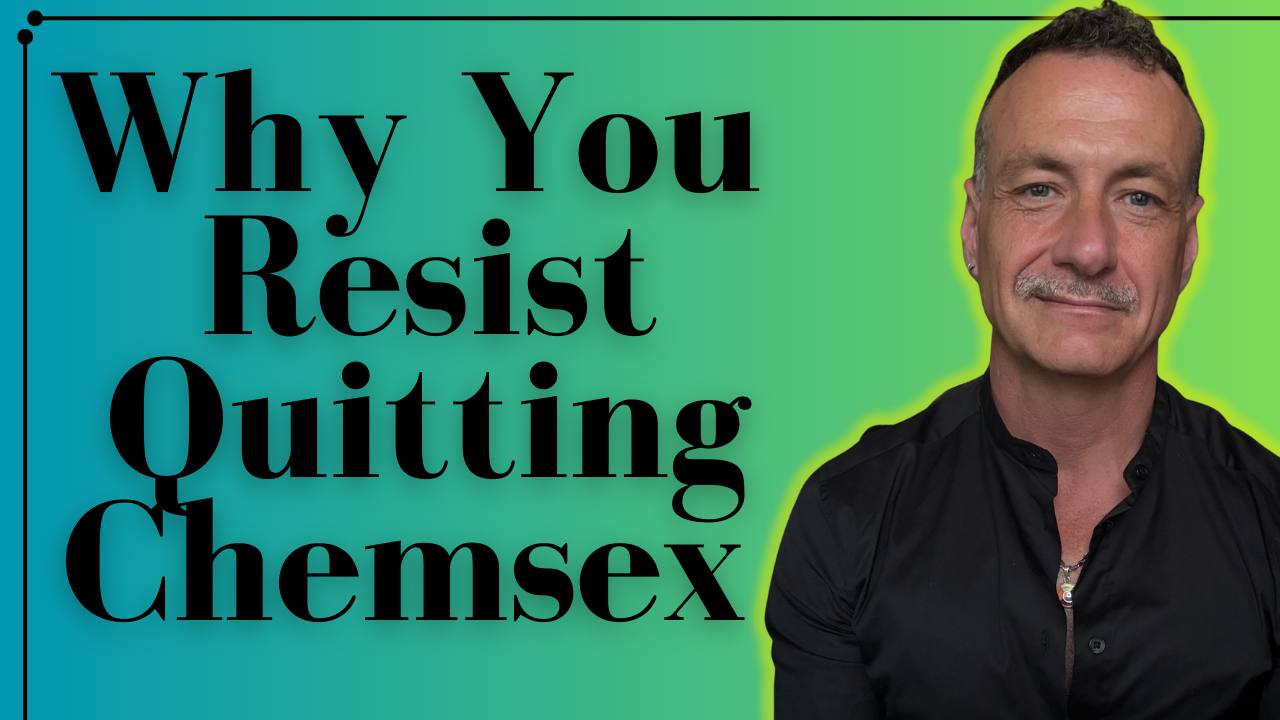
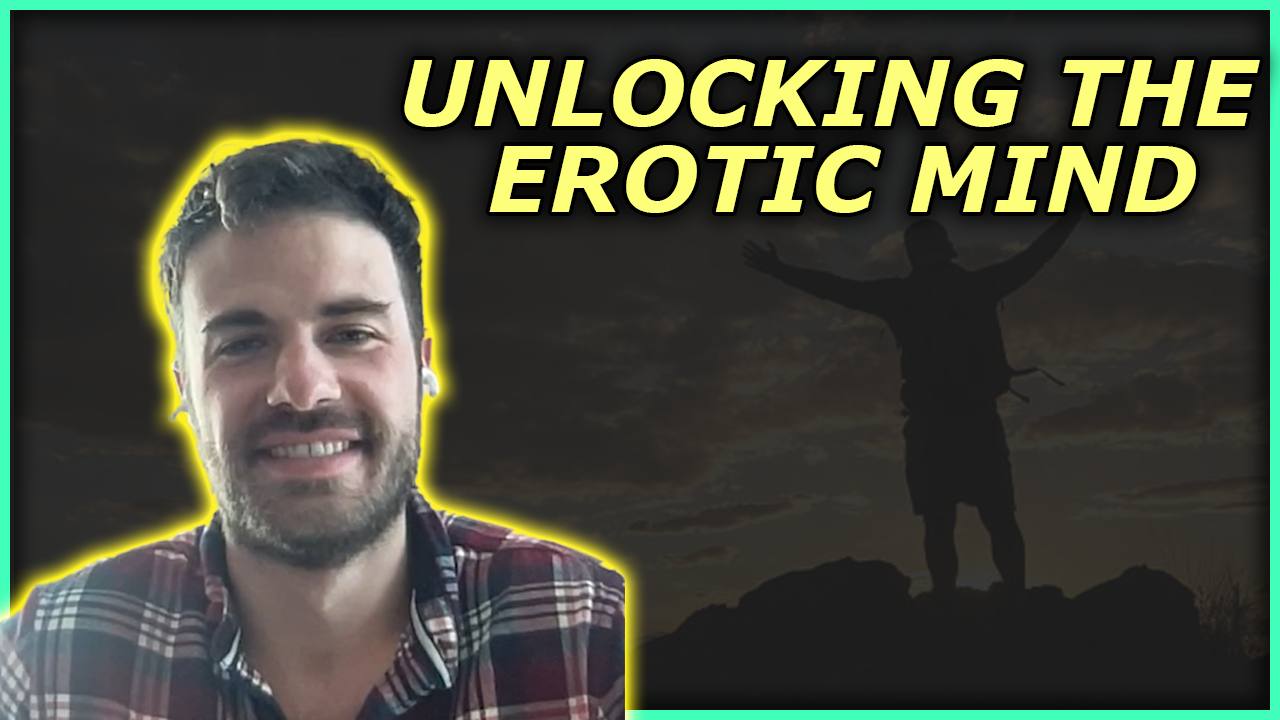
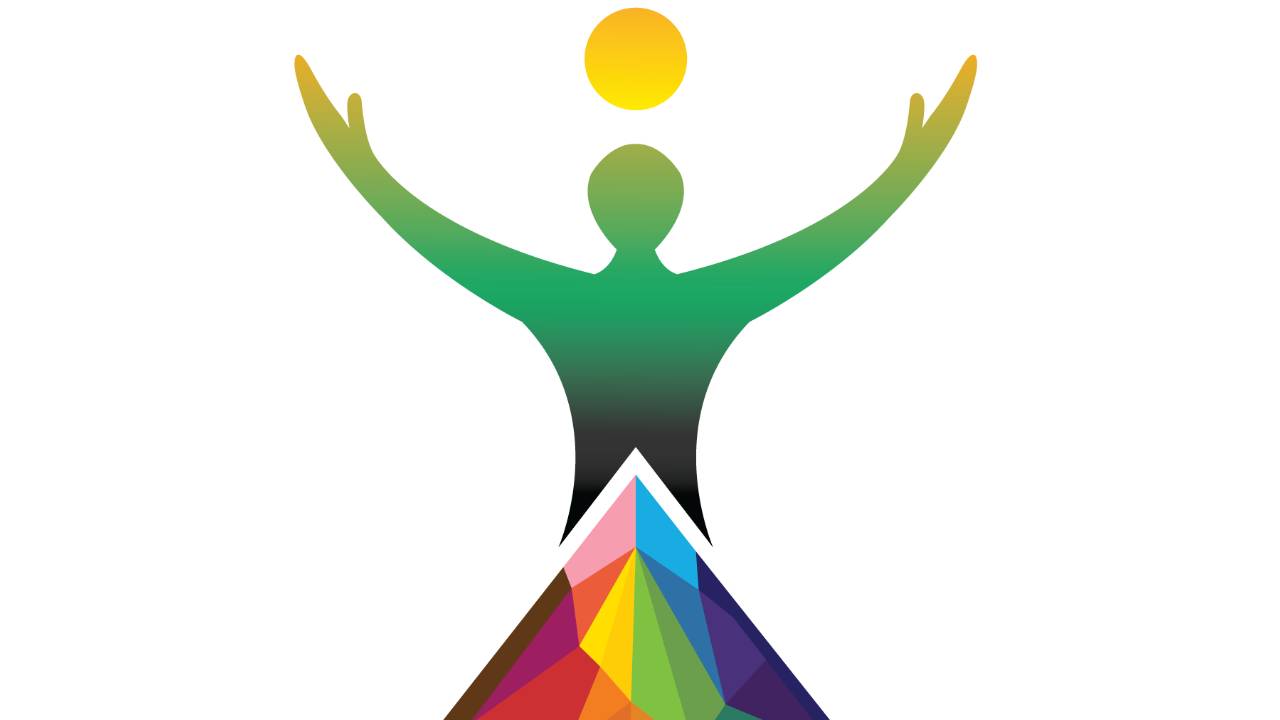
Responses